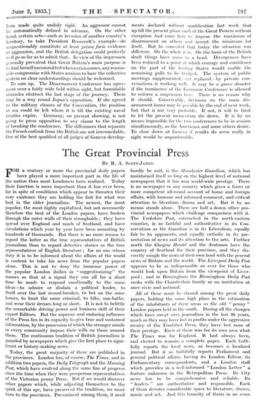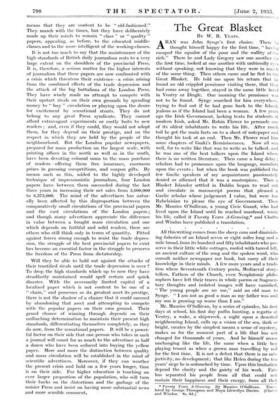The Great Provincial Press
BY R. A. SCOTT-JAMES.
FOR a century or more the provincial daily papers have played a more important part in the life of the nation. than most Londoners have realized. Today their function is more important than it has ever been, for in spite of conditions which appear to threaten their very existence they are holding the fort for what was best in the older journalism. The newest, the most popular, the most highly capitalized, but not necessarily therefore the best of the London papers, have broken through the outer walls of their strongholds ; they have spread over England and much of Scotland, and have- circulations which year by year have been mounting by hundreds of thousands. But there is no more reason to regard the latter as the true representatives of British journalism than to regard detective stories as the true representatives of English literature ; for no one whose duty it is to be informed about the affairs of the world is content to take his news from the popular papers alone. This is not to deny the immense power of the popular London dailies in " suggestionizing" the masses so that at a signal they can all for a short time be made to respond emotionally to the same ideas—to admire or disdain a political leader, to thrill over the last record-breaker, to bet on the same horses, to hunt the same criminal, to hike, sun-bathe, and wear their dresses long or short. It is not to belittle the remarkable driving power and business skill of their expert Editors. But the supreme and enduring influence of the Press lies in its capacity to give true and sustained information, by the possession of which the stronger minds- in every community impose their wills on those around them. The continuous tradition of British journalism is guarded by newspapers which give the first place to signi- ficant or history-making news.
Today, the great majority of these are published in the provinces. London has, of course, The Times, and in addition two papers, the Daily Telegraph and the Morning Post, which have evolved along the same line of progress since the time when they were prosperous representatives of the Victorian penny Press. But if we would discover other papers which, while adjusting themselves to the spirit of this age, have preserved the tradition, we must turn to the provinces. Pre-eminent among them, it need hardly be said, is the Manchester Guardian, which has maintained itself so long on the highest level of national newspapers that it has won world-wide prestige. There is no newspaper in any country which gives a fairer or more competent all-round account of home and foreign affairs, with humane and informed comment, and critical attention to literature, drama and art. But it by no means stands alone. There are half a dozen other pro- vincial newspapers which challenge comparison with it. The Yorkshire Post, entrenched in. the north-eastern counties, is as faithful and authoritative in its Con- servatism as the Guardian is in its Liberalism, equally fair to its opponents, and equally catholic in its pre- sentation of news and its attention to the arts. Further north the Glasgow Herald and the Scotsman have the country of Scotland for their province, and they dis- creetly mingle the news of their own land with the general news of Britain and the world. The Liverpool Daily Post appears to be as indispensable as ever for those who would look upon Britain from the viewpoint of Liver- pool ; and in Birmingham the Birmingham Daily Post ranks with the Chamberlain family as an institution at once civic and national.
. All of these must be classed among the great daily papers, holding the same high place in the estimation of the inhabitants of their areas as the old " penny " London papers held in the south. During all the changes which have swept over journalism in the last 80 years, much as they may have lost in profits under the aggressive rivalry of the Trustificd Press, they have lost none of their prestige. Each of them was for its own area what The Times was for England. It had always been, and elected to remain, a complete paper. Each faith- fully reports the local news, as becomes a localized journal. But it as faithfully reports Parliament and general political affairs, having its London Editor, its Parliamentary correspondents, and a London staff which provides in a well-informed "London Letter" a feature unknown in the Metropolitan Press. Its City news has to be comprehensive and reliable. Its " leaders " are authoritative and responsible. Each of them devotes considerable space to literature, drama, music and art. And this tenacity of theirs in no sense means that they are content to be " old-fashioned." They march. with the times, but they have deliberately made up their minds to remain " class " or " quality " papers, appealing, as before, to the educated middle- classes and to the more intelligent of the working-classes.
It is not too much to say that the maintenance of the high standards of British daily journalism rests to a very large extent on the shoulders of the provincial Press.' It is, therefore, a serious matter for the higher interests of journalism that these papers are now confronted with a crisis which threatens their existence—a crisis arising from the combined effects of the trade depression and the attack of the big battalions of the London Press. They have wisely made no attempt to compete with their upstart rivals on .their own grounds by spending money to " buy " circulation or playing upon the desire for excitement by sensational stunts. They do not belong to any great Press syndicate. They cannot afford extravagant experiments or costly baits to new readers ; and, even if they could, they would not adopt them, for they depend on their prestige, and on the respect in which they are held by the people of the neighbourhood. But the London popular newspapers, prepared for mass production on the largest scale, with printing offices in the north as well as .in the south, have been devoting colossal sums to the mass purchase of readers—offering them free insurance, enormous prizes in guessing competitions, and coupon gifts. By means such as this, added to the highly developed technique of impressionistic journalism, four London papers have between them succeeded during the last three years in increasing their net sales from 5,000,000 to 6,375,000. The mind of the advertisers has natur- ally been affected by this disproportion between the comparatively small circulations of the provincial papers and the vast circulations of the London papers ; and though many advertisers appreciate the difference in value between a bought mass circulation and one which depends on faithful and solid readers, there are others who still think only in terms of quantity. Pitted against forces strong enough to resist the trade depres- sion, the struggle of the best provincial papers to exist has become an essential factor in the struggle to preserve the freedom of the Press from dictatorship.
Will they be able to hold out against the attacks of their trustified rivals until the trade depression is over ? To drop the high standards which up to now they have steadfastly maintained would spell certain and quick disaster. With the necessarily limited capital of a localized paper which is not content to be one of a' " chain," and possesses as its greatest asset its prestige, there is not the shadow of a chance that it could succeed by abandoning that asset and attempting to compete with the popular papers on their own ground. Their- grand chance of winning through depends on their unflinching determination to maintain their present high standards, differentiating themselves completely, as they do now, from the sensational papers. It will be a power- ful factor on their side that one person who takes in such a journal will count for as much to the advertiser as half a dozen who have been seduced into buying the yellow paper. More and more the distinction between quality and mass circulation will be established in the mind of scientific advertisers. Moreover, if they can weather the present crisis and hold on a few years longer, time is on their side. For higher education is touching an ever larger proportion of the population, who will turn their backs on the distortions and the garbage of the noisier Press and insist on having more substantial news and more sensible comment. • •





































 Previous page
Previous page